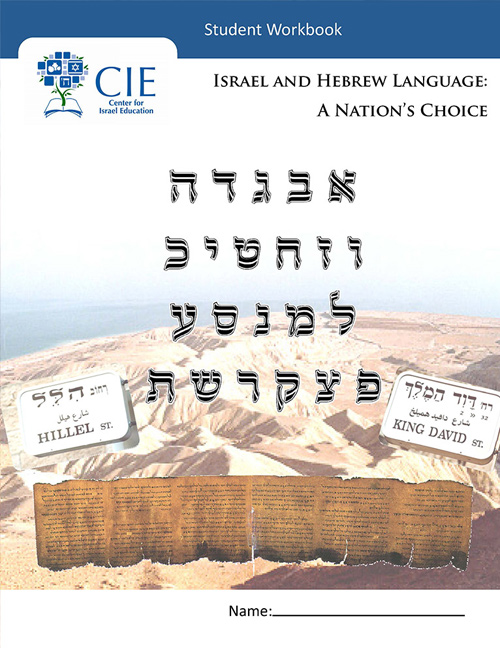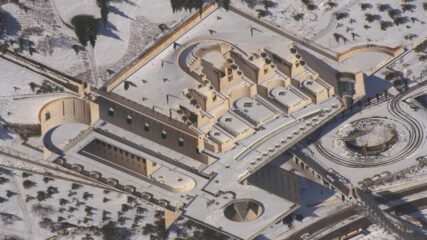CIE has compiled the following list of books and articles, including some available on our website, to guide understanding of Israeli literature and the evolution and adoption of the modern Hebrew language.
Books
Aberbach, David. Bialik, the Hebrew Bible and the Literature of Nationalism. London: Routledge, 2023.
Abramovich, Dvir. Fragments of Hell: Israeli Holocaust Literature. Boston: Academic Studies Press, 2019.
Abramson, Glenda. The Oxford Book of Hebrew Short Stories. New York: Oxford University Press, 1997.
Alter, Robert. Modern Hebrew Literature. West Orange, NJ: Behrman House, 1975.
Alter, Robert. Hebrew and Modernity. Bloomington: Indiana University Press, 1994.
Bargad, Warren. From Agnon to Oz: Studies in Modern Hebrew Literature. Atlanta: Scholars Press, 1996.
Bargad, Warren, and Stanley F. Chyet. Israeli Poetry: A Contemporary Anthology. Bloomington: Indiana University Press, 1988.
Bar-Adon, Aaron. The Rise and Decline of a Dialect: A Study in the Revival of Modern Hebrew. La Hague: Mouton, 1979.
Bar-Yosef, Hamutal. Mysticism in 20th Century Hebrew Literature. Boston: Academic Studies Press, 2010.
Blocker, Joel. Israeli Stories. New York: Schocken, 2001.
Center for Israel Education. Israel and Hebrew Language: A Nation’s Choice. Atlanta: Center for Israel Education, 2016.
Chomsky, William. Hebrew: The Eternal Language. Philadelphia: Jewish Publication Society of America, 1986.
Chotzner, J. Hebrew Satire. Oxon: Routledge, 2018.
Diamond, James S. Barukh Kurzweil and Modern Hebrew Literature. Brown Judaic Studies, 2020.
Domb, Risa. New Women’s Writing From Israel. London: Vallentine Mitchell, 1996.
Elon, Amos. The Israelis: Founders and Sons. New York: Penguin, 1983.
Glazer, Miriyam. Dreaming the Actual: Contemporary Fiction and Poetry by Israeli Women Writers. Albany: State University of New York, 2015.
Glinert, Lewis. The Story of Hebrew. Princeton University Press, 2017.
Gluzman, Michael. The Politics of Canonicity: Lines of Resistance in Modernist Hebrew Poetry. Stanford: Stanford University Press, 2003.
Gold, Nili Rachel Scharf. “Amichai’s Open Closed Open and Now and In Other Days: A Poetic Dialogue,” History and Literature: New Readings of Jewish Texts in Honor of Arnold J. Band, edited by William Cutter and David C. Jacobson. Brown Judaic Studies, 2020: 465-478.
Hakak, Lev. Modern Hebrew Literature Made Into Films. Lanham, MD: University Press of America, 2001.
Harshav, Benjamin. Language in Time of Revolution. Stanford, CA: Stanford University Press, 1999.
Hasak-Lowy, Todd. Here and Now: History, Nationalism, and Realism in Modern Hebrew Fiction. Syracuse, NY: Syracuse University Press, 2008.
Hever, Hannan. Producing the Modern Hebrew Canon: Nation Building and Minority Discourse. New York: New York University Press, 2002.
Henig, Roni. On Revival: Hebrew Literature Between Life and Death. Philadelphia: University of Pennsylvania Press, 2025.
Hoffman, Haya. Not Just Milk and Honey: An Anthology of Hebrew Short Stories. New Delhi: National Book Trust, India, 1998.
Isaksen, Runo. Literature and War: Conversations With Israeli and Palestinian Writers. Northampton, MA: Olive Branch, 2009.
Jacobson, David C. Creator, Are You Listening? Israeli Poets on God and Prayer. Bloomington: Indiana University Press, 2007.
Karmi, T., ed. The Penguin Book of Hebrew Verse. London: Penguin, 2006.
Lapidus, Rina. Russian Ideational Roots of Jewish Thought and Hebrew Literature. Brookline, MA: Academic Studies Press, 2024.
Levy, Lital. Poetic Trespass: Writing Between Hebrew and Arabic in Israel/Palestine. Princeton: Princeton University Press, 2014.
Liebmann, Charles Seymour. Civil Religion in Israel. University of California, 1983.
Miller, Giulia. Reconfiguring Surrealism in Modern Hebrew Literature: Menashe Levin, Yitzhak Oren and Yitzhak Orpaz. London: Vallentine Mitchell Publishers, 2013.
Mintz, Alan. “Banished From Their Father’s Table”: Loss of Faith and Hebrew Autobiography. Bloomington: Indiana University Press, 1989.
Mintz, Alan. Reading Hebrew Literature: Critical Discussions of Six Modern Texts. Hanover, NH: University Press of New England, 2003.
Mintz, Alan. Translating Israel: Contemporary Hebrew Literature and Its Reception in America. Syracuse, NY: Syracuse University Press, 2001.
Miron, Dan. The Prophetic Mode in Modern Hebrew Poetry. Milford, CT: Toby Press, 2010.
Peleg, Yaron. Israeli Culture Between the Two Intifadas: A Brief Romance. Austin: University of Texas Press, 2008.
Peleg, Yaron. Orientalism and the Hebrew Imagination. Ithaca, NY: Cornell University Press, 2005.
Pinsker, Shachar. Literary Passports: The Making of Modernist Hebrew Fiction in Europe. Stanford, CA: Stanford University Press, 2010.
Raizen, Esther. No Rattling of Sabers: An Anthology of Israeli War Poetry. Austin: University of Texas, 1996.
Schachter, Allison. Diasporic Modernisms: Hebrew & Yiddish Literature in the Twentieth Century. New York: Oxford University Press, 2012.
Schwartz, Yigal and Michal Sapir. The Zionist Paradox: Hebrew Literature and Israeli Identity. Waltham, MA: Brandeis University Press, 2014.
Shaked, Gershon. The New Tradition: Essays on Modern Hebrew Literature. Cincinnati: Hebrew Union College Press, 2006.
Shaked, Gershon, Yael Lotan, Emily Miller Budick and Jessica Cohen. Modern Hebrew Fiction. Bloomington: Indiana University Press, 2000.
Shṿarts, Yigal. The Zionist Paradox: Hebrew Literature and Israeli Identity. Lebanon: Brandeis University Press, 2014.
Silberschlag, Eisig. From Renaissance to Renaissance: Hebrew Literature From 1492-1970. New York: Ktav, 1973.
Stahl, Neta. The Divine in Modern Hebrew Literature. London: Routledge, 2020.
Yudkin, Leon I. 1948 and After: Aspects of Israeli Fiction. Manchester: University of Manchester, 1984.
Zakim, Eric. To Build and Be Built: Landscape, Literature, and the Construction of Zionist Identity. Philadelphia: University of Pennsylvania Press, 2006.
Zilbergerts, Marina. The Yeshiva and the Rise of Modern Hebrew Literature. Bloomington: Indiana University Press, 2022.
Articles
Abramovich, Dvir, “Sleuthing in Modern Hebrew Literature: Investigating Israeli Society,” Mentalities/Mentalités 28.3 (2016): 1-17.
Abramovich, Dvir, “Testing the Limits of Holocaust Representation in Modern Israeli Literature,” The Australian Journal of Jewish Studies, 23 (2009): 5-16.
Alterman, Natan, “Victory as a Scapegoat,” Ma’ariv, 1969, translated and with introduction by Scott Abramson, Center for Israel Education, March 2025.
Ashkenazi, Yiftach, and Dekel Shay Schory, “An Introduction to Hebrew Lit: Congruency, Clash, and Collision,” World Literature Today 95, No. 1 (2021): 56-57.
Asscher, Omri, “The Ideological Manipulation of Hebrew Literature in English Translation in the 1970s and 1980s,” Journal of Modern Jewish Studies, 15:3 (November 2016): 384-401.
Bargad, Warren, “The Image of the Arab in Israeli Literature,” Hebrew Annual Review, 1 (1977): 53-65.
Bar-Yosef, Eitan, “Bonding With the British: Colonial Nostalgia and the Idealization of Mandatory Palestine in Israeli Literature and Culture after 1967,” Jewish Social Studies, 22:3 (2017): 1-37.
Dynes, Ofer, and Naomi Seidman, “The Beginnings of Modern Jewish Literature,” Prooftexts 38, No. 2 (2020): 199-211.
Harris, Rachel S., “Israeli Literature in the 21st Century: The Transcultural Generation: An Introduction,” Shofar, 33:3 (2015): 1-14.
Hoare, Liam, “1967 — Nathan Alterman or Amos Oz: The Six-Day War and Israeli Literature,” Fathom, Spring 2017.
Levy, Lital, and Allison Schachter, “Jewish Literature/World Literature: Between the Local and the Transnational,” Publication of the Modern Language Association of America, 130:1 (January 2015): 92-109.
Maschiach, Celina, “Face to Face: Self and Other in Israeli Children’s Literature,” Bookbird: A Journal of International Children’s Literature, 48:1 (2010): 23-29.
Miron, Dan, “A Straight Arrow: On the Essential National Principle of Modern Hebrew Literature,” Prooftexts 38, No. 2 (2020): 212-37.
Moore-Gilbert, Kylie, “Aliyah and Identity in Israeli-Russian Literature,” Transnational Literature, 7:1 (2014): 1-11.
Morahg, Gilead, “New Images of Arabs in Israeli Fiction,” Prooftexts, 6:2 (1986): 147-162.
Nir, Oded, “Israeli Literature and the Time of ‘Post-Post-Zionism,’” CLCWeb: Comparative Literature and Culture, 21:2 (2019).
Ofengenden, Ari, “National Identity in Global Times: Therapy and Satire in Contemporary Israeli Film and Literature,” The Comparticist, 39 (2015): 294-322.
Olmert, Dana, “Mothers of Soldiers in Israeli Literature: The Return of the Politically Repressed,” Prooftexts, 33:3 (2013): 333-364.
Oz, Amos, “The Whole Reckoning Is Not Over Yet,” translated and with introduction by Scott Abramson, Center for Israel Education, December 28, 2024.
Peleg, Yaron, “A New Hebrew Literary Diaspora? Israeli Literature Abroad,” Studia Judaica, 18 (2015): 321-338.
Pinsker, Shachar, “That Yiddish Has Spoken to Me: Yiddish In Israeli Literature,” Poetics Today, 35:3 (2014): 325-356.
Ronen, Shoshana, “Post-Holocaust Representations of Poland in Israeli Literature,” The Polish Review 60:3 (2015): 3-20.
Ronen, Shoshana, “Yehoshua Ozjasz Thon on the Revival of Hebrew Literature: From Revolutionism to a Moderate Conservatism,” Polin Studies in Polish Jewry, 28 (2016): 139-152.
Rudin, Shai, “The Poetics of Horror: Representation of Violence Against Women in Israeli Women’s Literature,” Women in Judaism, 9:1 (2012): 1-32.
Schrire, Dani, “Zionist Folkloristics in the 1940s-1950s: Diasporic Cultures and the Question of Continuity,” Hebrew Studies, 60 (2019): 197-222.
Shait, Heddy, “The Dilemma of Missing Soldiers in Contemporary Israeli Literature: Narratives of Quest and Deviation,” Australian Journal of Jewish Studies, 26 (2012): 70-94.
Shavit, Avner, “Conversation Within: The Image of Ultra-Orthodoxy in Israeli Literature and Cinema,” Kwartalnik Historii Zydow, 3 (2014): 597-604.
Shiffman, Smadar, “If Not Now, When? Israeli Literature and Political Responsibility,” Israel Studies Forum, 20:1 (2005): 70-82.
Shvarts, Yigal, “The Person, the Path, and the Melody: A Brief History of Identity in Israeli Literature,” Prooftexts, 20:3 (2000): 318-339.
Tooman, William A., “Authenticating Oral and Memory Variants in Ancient Hebrew Literature,” Journal of Semitic Studies, 64:1 (Spring 2019): 91-114.
Weininger, Melissa, “Language Politics: The Boundaries of Homeland and Translingual Israeli Literature,” Studies in the Novel, 48:4 (2016): 477-493.










